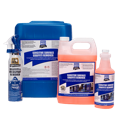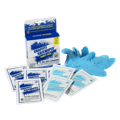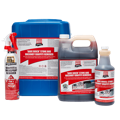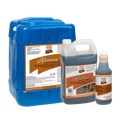Understanding the different types of street signs will help you determine the vulnerability of each sign before approaching them.
Screen printed signs that are likely to be placed in a location highly susceptible to graffiti, must be protected with a vandal film (aka protective overlay film) commonly manufactured by 3M (and other film/laminate suppliers). Once this laminate is on the sign, any of our products are suitable for cleaning.
However, we have noticed that the continued use of harsher strippers, thinners, and other solvents, as well as expo- sure to UV sunlight has a tendency to make these films go brittle within their warranty period. Once the laminate is degraded in this way, graffiti markers can begin to impregnate/stain the plastic sheeting.
There are four main types of sign sheeting in use on street signs. In order of reactivity, these are porcelain or painted metal, engineering-grade sheeting, high-intensity prismatic grade sheeting, and the newer diamond grade reflective sheeting. Street signage is created by either screen printing onto these surfaces or using vinyl cut laminates to create the lettering.
In our experience, the more reactive the sheeting, the more vulnerable some of the screen-printed paints are to damage by graffiti markers and/or the removers.
One main reason is that the signs are not wiped off properly with a damp cloth after removing graffiti. When cleaning these signs ALWAYS do a little before you do a lot using Sensitive Surface Graffiti Remover (SSGR) first, or Graffiti Safewipes. It is sometimes difficult to tell whether the sign has a protective overlay on it or not, so proceed cautiously.
As with all graffiti, the sooner you get to clean it, the easier it is. Graffiti attempted before 72 hours of age is always easier than old-aged sunbaked graffiti.
Most vinyl cut lettering on reflective street signs is fairly durable and resistant to Sensitive Surface Graffiti Remover. You may need to leave the SSGR on a little longer or use a soft white scourer to crack the surface of the spray can to speed up the process.
Street signs are generally mounted on sheets of aluminum which are exposed on the back. The back of signs can normally be cleaned with Sensitive Surface Graffiti Remover also. Occasionally, you may need to pep up your SSGR with some Bare Brick, Stone & Masonry Graffiti Remover for stubborn, thicker spray cans.
Alternatively, use our Heritage product.
Some ink markers can appear to stain the aluminum back of signs. If this should occur you may want to try your muriatic solution (8 parts water; 1 part muriatic). This can be used, brush on / wipe off.
Alternatively, have a spray paint can of ‘silver frost’ color handy to mist over the stain and then move on.
Products Mentioned
Important
When cleaning these signs ALWAYS do a little before you do a lot using Sensitive Surface Graffiti Remover (SSGR) first, or Graffiti Safewipes. It is sometimes difficult to tell whether the sign has a protective overlay on it or not, so proceed cautiously.
As with all graffiti, the sooner you get to cleaning it, the easier it is. Graffiti attempted before 72 hours of age is always easier than old-aged sunbaked graffiti.
Expert Advice
Click on any of the icons below for more how-to's and advice









